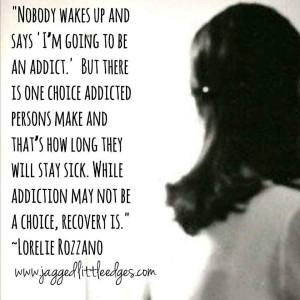
In the last decade, we’ve come a long way towards understanding addiction. Once thought of as an immoral issue associated with weak-willed persons, now most people view addiction as a disease that’s progressive in nature, delusional in thinking, and maladaptive in behavior.
Addicted persons are our parents, siblings, spouses, friends, doctors, lawyers, firefighters, pilots, teachers, servers, laborers, and everyone else who makes up the workforce. Most addicted persons have homes and those who don’t, have the streets.
The streets in some big cities have become a refuge for addicted persons. There are many resources available to them there; housing, medical attention, free needles, consumption tents to inject IV drugs, free clothing, shelters to sleep, etc.
There are more resources available to addicted persons now than ever before, and yet addiction continues to explode in our population. Some of this is due to doctors overprescribing oxycodone, and the resulting heroin epidemic afterward.
But not every substance abuser started with prescription medication. Some began experimenting in high school with their friends. Genetics and environmental factors played its part and those most vulnerable became addicted.
Researchers have found that much of addiction’s power lies in its ability to hijack and destroy key brain regions that are meant to help us survive. The brains’ pleasure center becomes hijacked, and critical thinking reroutes through the old brain, the part of the brain responsible for our survival. This part of the brain screams, ‘get dope or die!’
In spite of our many advances, addition continues to outwit us all. Science says addiction overrides a person’s reasoning and impulse control. We’re told addicts must hit rock bottom. Yet for many, rock bottom is in a casket. Our policy is persons with addiction must admit they need help before they can get treatment and ultimately, survive their illness. Controversially, we know addicted persons are delusional and incapable of rational thinking.
So which is it?
Persons with addiction must come to their senses in a moment of clarity (this debunks the disease model) and agree to get help.
Or
Persons with addiction will continue to grow progressively sicker (this upholds the disease model) as they’re incapable of reasoning and making sound decisions.
If we truly believe addiction is a progressive and terminal disease which renders persons incapable of making sound decisions then why aren’t we following up with mandated treatment? Every time someone overdoses, why are they let go (where they go right back to using and often overdose again) instead of getting transferred into a rehab facility,
Speaking with the addicted population on the street, they tell me they have a disease. It’s not their fault. I agree. It’s not. I think back to the days when I was addicted. Tolerance for my poor choices wasn’t very high back then. Instead, I heard – you need help, go to rehab. For Christs sakes clean yourself up and get your shit together! No one told me I had a disease. No one offered me free needles. There were no consumptions sites, or free using kits. The message I got was loud and clear – I needed help, and living my life in the gutter was not to be tolerated.
I’m 21 years clean and sober now, and as I look around at all the ‘help’ and resources available to addicted persons today, I thank God I got clean/sober when I did. Tolerance for me killing myself was not in my best interest. Nor is it in any addicted persons. We are already killing ourselves and we don’t need society to enable us in the process.
As I look around at the ever-growing numbers of addicted persons, I’m left to wonder if we as a society have turned a corner, becoming so compassionate we now play a part in encouraging addiction. It’s an absurd idea, I know and yet one I can’t shake.
While nobody wakes up and says ‘I’m going to be an addict’ there is one decision addicted persons make and that’s how long they’ll stay sick. While addiction may not be a choice, recovery is.
Perhaps as a society, our compassion could do more than give out free needles and more shelter beds. For severely mentally ill, addicted persons who have lost the ability to reason and can’t fight for their lives, their best chance at survival is mandated, long-term dual diagnosis treatment followed by a sober living environment and outpatient continuum of care. Yes, it’s going to cost a terrific amount of money. But if you factor in the cost of reducing the harmful impact addiction has on communities, the price is already high. Society is now traumatized by the people who were once described as the cities most vulnerable population. But the tides have changed and the most vulnerable now are our seniors, our children, our taxpayers and everyone who loses a little more hope when they head out to work each morning only to come home and find their child’s bike is missing, or their house was broken into. The real tragedy is every addict has the potential of recovering, whether they want to or not. Ask any parent with an addicted child if we should put a dollar value on saving lives, and their answer will be no.
So the next time you hear about another consumption site coming to your town, ask questions. What about treatment? Do you encourage people to seek help? I recently asked one harm reduction worker this, and she replied, “I don’t talk to clients about recovery. It’s not in my job description. I’m there to prevent overdose.” While preventing overdose is an important factor, after all, dead addicts can’t recover, we must insist on more than palliative care which keeps end-stage addicts comfortable in their illness.
Truthfully, an addict made comfortable in their ilness will never seek help. Why would they? Everything they need is being taken care of for them. It’s time to face reality. We’re all affected by addiction. It’s costing every one of us. I’m told we’re doing the best we can. Sadly our best is not helping. It’s time to step out of what we’ve been doing and try something new. I’d like to see mandated treatment laws in every state and province across North America. Let’s help people get well, not hand them more needles to continue killing themselves. What are your thoughts on this topic?


Keith Anderson
This is an interesting website with an interesting perspective.
I agree with you that society appears to be enabling addiction and I believe that the unsolvable problem is finding the right balance point on the continuum of harm reduction for both society and the addicted vs leaving the addicts to suffer the consequences of their own actions in a meaningful way that ultimately encourages the internal decision to get clean.
The reason that no one anywhere has really figured it out as a “system” is that the balance point is unique to each individual addict. For some zero support and a rapid crash seems to shock them into the decision to tackle their addiction, but for others that same approach seems to lead them abandon all hope and just spiral down to an overdose death. Meanwhile for others protecting them from overdoses and providing other supports prevents a descent into a related criminal lifestyle which means that they still have a way out if they choose it, and some do, but for those that don’t they simply take advantage of those supports to enable their addiction based lifestyle and to even support their criminal lifestyle.
It is an unwinnable game.
From a public policy perspective we also face challenges that differ on each side of the 49th. In the US you have no public health care system but you do have courts that are far more willing to incarcerate people. So on your side of the border forced in-patient style treatment within your prison systems might be an option through criminal convictions. But a medical approach would be impossible to achieve there without massive reform to your general public health and health care regime.
On the Canadian side we have a court system that is hesitant to incarcerate anyone for almost anything. So a prison based approach would be impossible without major court reforms. On the other hand we have public health care so a mental health based approach could work here where mandatory treatment through mental health warrants could be accomplished.
Sadly on both sides of the border though we face the same challenge that every other political jurisdiction in the world faces … it would literally bankrupt our nations to put in place a mandatory residential treatment program for every addict and the science so far is telling us that we don’t have any treatment protocols that are consistently able to achieve long-term sobriety when the addict is forced to participate rather than seeks treatment themselves.
So to sum it up I have reached the unfortunate conclusion in more than 26 years of working in a related field that in a “free” democratic society we are stuck with the reality that each of us is free to live our lives as we wish, and that if our wishes are to throw our own lives away through addictions then all that society can really do is protect others from the actions of the addicts. If the addict chooses to seek help and makes a genuine effort at being productive and sober, then tax funded treatment centers and options should definitely be there to give that help. But where the addict would prefer to live life as an addict then I think that the best society can do is to try to reduce the collateral damage that the addicts do to everyone else.
I almost find many addictions problems to be a form of slow suicide. The addicts know the risk, they take the risk willingly, and they choose the addiction over the available option of sobriety even when given countless opportunities to get clean and stay clean. I have also reached this conclusion because I have seen addicts of all social groups, ages, genders, etc. I have known so many who can get clean and stay clean when they want to be sober for a reason and then when they decide that they want to get high or drunk again they simply make that choice and return to the lifestyle. That experience has taught me that while the science does show us an underlying biological change and that while some addictions are more physical than others, all addictions share a very psychological core and that the free will of the addict remains a very key element in all but the most exceptional of cases.
Therefore, as long as society continues to grant us the right of free will, a right that I cherish greatly and would fight to protect, we cannot solve the addictions problem for those that choose to be addicted. And while I can’t speak for many places in the US, I can speak for many in Canada and I know of literally dozens of treatment programs and options for any addict that chooses to break out of the addictions cycle.
The high failure rate of most of those programs seems to be, in my experience again, that most of the addicts in any of the programs are there because they are doing it for someone else. They are there because parents have made them go, or because it is a way to avoid jail for criminal offences, or because Child Services has made them attend. In short they are there because someone else in their life has pressured them to seek and take treatment as a means of obtaining something they want or avoiding something they don’t, but as soon as that pressure is gone the addict once again chooses to seek the highs and the cycle begins again.
So in the end we are better off, in my opinion, never forcing anyone to seek treatment and keeping the treatment spaces open for everyone that actually wants to attend so that there is a space available somewhere for every addict when they make their own internal choice to seek help.
Lorelie
Thank you for a very thought out response to this difficult and controversial topic. To quote “we are stuck with the reality that each of us is free to live our lives as we wish” you have hit on the sticking point. Once you cross the line into addiction you’re no longer free to live as you wish. Addiction hijacks the cerebral cortex in a way that overrides reasoning and impulse control making it virtually impossible (without intervention) to quit or act under your own free will. At this point, addicted persons reach a state of hopelessness and no longer care if they live or die.
Margaux
I totally agree with you!
Regina
100% Paid for with federal state and local tax. The biggest problem with getting into treatment is how to pay for it. Addicts can not earn a living at a regular job most of the time while using and most employers dont provide insurance anymore. And it treatment centers should never become a lucrative business. Check out SAMHSA.gov
Diane
My son’s first rehab lasted 14 days. He came home on Christmas Eve and was nodding off at dinner. He stayed four days at the second rehab…they wouldn’t let him watch tv or go outside. Then he went to Battle Creek, Michigan. Stayed three months, then they sent him to sober living in Mesa, Arizona…big mistake. He got kicked out for using, he had no job, no place to live, no food. I brought him home and that started the worst year of my life, him using, lying, stealing, manipulating. After several more attempts to get clean, my son went to west palm beach, Florida and was clean for 16 months. He and the girlfriend, another addict, came back to Wilmington because she was pregnant. The baby is 2-1/2 and her parents are still using. They are going to die if they don’t get help soon. 30 days isn’t going to do a thing…we need long term, in house, lock-down treatment. Please help. Diane
Lorelie
Diane, if your son is resistant to getting help and has lost the ability to fight for his life you may be able to mandate him to treatment. Check into commitment laws in your state or province.
C E Taylor
I could not agree more! If we spent the same amount of money on mandated treatment that we spend on the inmates that are locked up for drug abuse crimes we could prevent them from ending up back in jail!!
Regina
Exactly
Malea Miller
I’ve gotten alot out of this. I have to keep telling myself this is a disease.
Kevin Morris
I’m a firmly believe society is the problem, enablers who simply need to stop carering to this behavior. I strongly agree it’s only this way because 75% or more addicted are white people! Back in the 80 when it was crack they sent blacks to prison over having a pipe. I know people right not with 7 or more charges for heroin and free ass a bird. Going to rehabs to meet new people to get high with have sex with girls and party. These judges in Ohio let them out on signature bonds to steal, rob and do more crime.. I use ti try and help these people but now no, it’s too dangerous. These people will bring down anyone who close enough to get too.
Where is the help for the people who fell helping the addicts. I’m one of them, now the person I helped can get all the help in the world and I’m ass out and he get to do it all off my tax money. I’m a victim of that myself so I decided to love me enough not to even remotely talk to a addict! They are soulless and your they prey. So why anyone who know better try is beyond me. I learned my lesson. I might call for help that all